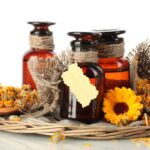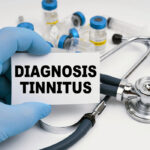Key Takeaways
- Ginkgo biloba is the most studied herbal remedy for tinnitus, with some research suggesting it may improve blood flow to the inner ear and potentially reduce symptoms.
- Mineral supplements like zinc and magnesium may address underlying deficiencies that could contribute to tinnitus symptoms.
- Traditional Chinese herbal formulas offer systematic approaches to tinnitus management based on different symptom patterns.
- Combining herbal remedies with lifestyle modifications often yields better results than using herbs alone.
- Always consult with healthcare providers before starting any herbal treatment for tinnitus, especially if you’re taking other medications.
Tinnitus—that persistent ringing, buzzing, or hissing sound in your ears that no one else can hear—affects millions of people worldwide. While conventional medicine offers limited solutions, herbal remedies have gained attention as potential allies in managing this frustrating condition. The key is knowing which herbs actually work and which are simply marketing hype.
Natural approaches to tinnitus management have been used across cultures for centuries, with Rupa Health being at the forefront of integrating traditional wisdom with modern understanding of auditory health. Their comprehensive protocols combine herbal remedies with lifestyle modifications to address tinnitus from multiple angles, offering hope to those who’ve found little relief through conventional methods.
Before diving into specific herbs, it’s important to understand that tinnitus isn’t a disease itself but a symptom of various underlying conditions. This explains why some herbal remedies work wonderfully for some people but do nothing for others. Your particular type of tinnitus—whether it’s related to circulation problems, nerve damage, stress, or other factors—will determine which herbal approach might work best for you.
Ginkgo Biloba: The Most Studied Herb for Tinnitus Relief

“Does Ginkgo Biloba Really Help Tinnitus …” from americanhearing.us and used with no modifications.
When it comes to herbal remedies for tinnitus, ginkgo biloba stands out as the most researched option. This ancient herb has been used in traditional Chinese medicine for thousands of years and has gained popularity in Western herbalism specifically for circulation-related conditions. The research on ginkgo for tinnitus shows mixed results, but many studies suggest it may help reduce symptoms, particularly for those whose tinnitus stems from poor circulation to the inner ear.
Ginkgo contains powerful flavonoids and terpenoids that work as antioxidants while improving blood flow throughout the body—including the delicate vessels that supply the inner ear. This improved circulation may help deliver nutrients and oxygen to auditory cells while removing waste products more efficiently. For tinnitus sufferers whose symptoms worsen when they’re tired or stressed (states that can reduce circulation), ginkgo may offer noticeable relief.
How Ginkgo Improves Blood Flow to the Inner Ear
Ginkgo biloba works through multiple mechanisms that can benefit tinnitus sufferers. First, it acts as a vasodilator, relaxing blood vessels and allowing more blood to reach the tiny capillaries of the inner ear. Second, it reduces blood viscosity (thickness), helping blood flow more freely through narrow vessels. Third, it contains antioxidant compounds that protect delicate ear structures from oxidative damage that might contribute to tinnitus.
The ear requires excellent circulation to function properly, as the cochlea and vestibular system are metabolically demanding tissues. When blood flow becomes restricted due to age, cardiovascular issues, or stress, the resulting oxygen deficiency can trigger or worsen tinnitus symptoms. Ginkgo’s ability to cross the blood-brain barrier means it can directly affect the neural pathways involved in sound processing and perception.
“While many herbal supplements claim to help tinnitus, ginkgo biloba has the strongest research foundation. A standardized extract containing 24% flavone glycosides and 6% terpene lactones appears to offer the most consistent results when taken over a period of 8-12 weeks.” – From Liu D, et al. (2022) review on herbal medicines for tinnitus
Recommended Dosage and Preparation Methods
For tinnitus management, clinical studies typically use standardized ginkgo biloba extract at dosages between 120-240mg daily, divided into two or three doses. Look for extracts standardized to contain 24% flavone glycosides and 6% terpene lactones for consistency with research protocols. Lower dosages may not provide therapeutic effects, while higher amounts haven’t shown additional benefits and may increase the risk of side effects.
Ginkgo can be taken as capsules, tablets, tinctures, or teas, though standardized extracts in capsule form offer the most reliable potency. Morning and evening dosing helps maintain consistent blood levels throughout the day. Be patient—ginkgo typically requires 4-6 weeks of regular use before improvements become noticeable, with optimal benefits often appearing after 12 weeks of consistent supplementation.
| Form | Typical Dosage | Advantages | Considerations |
|---|---|---|---|
| Standardized Extract (Capsules) | 120-240mg daily | Consistent potency, convenient | Best researched form |
| Tincture | 20-40 drops, 2-3 times daily | Rapid absorption | Alcohol base may affect some people |
| Tea | 1-2 cups daily | Ritual of preparation can be calming | Less concentrated, inconsistent dosing |
What Scientific Research Reveals About Effectiveness
The scientific evidence regarding ginkgo biloba for tinnitus presents a complex picture. A comprehensive review published in the Journal of Ethnopharmacology analyzed 28 clinical trials and found that while some studies show significant benefits, others show minimal or no improvement compared to placebo. This inconsistency may reflect differences in study design, participant selection, and the varying causes of tinnitus among participants.
CBD Oil: Emerging Evidence for Tinnitus Management

“CBD for Tinnitus: Can It Help …” from vitalitycbd.com and used with no modifications.
CBD oil has garnered significant attention in recent years as a potential remedy for various conditions, including tinnitus. Derived from the cannabis plant but without the psychoactive effects of THC, CBD interacts with the body’s endocannabinoid system, which plays a role in regulating various physiological processes including inflammation and nervous system function. Early research suggests CBD might help tinnitus sufferers by addressing underlying inflammation and nervous system hyperactivity.
How CBD May Reduce Inflammation in the Auditory System
The auditory system, particularly the cochlea, is highly susceptible to inflammatory damage that can trigger or worsen tinnitus symptoms. CBD has demonstrated potent anti-inflammatory properties in multiple studies, potentially reducing inflammation in the delicate structures of the inner ear. By interacting with CB1 and CB2 receptors found throughout the auditory pathways, CBD may help normalize the heightened neural activity often associated with tinnitus perception.
Finding the Right Concentration and Delivery Method
When considering CBD for tinnitus, concentration and delivery method significantly impact effectiveness. Full-spectrum CBD oils containing minimal THC (less than 0.3%) along with other beneficial cannabis compounds may provide enhanced benefits through the “entourage effect” compared to CBD isolate products. Starting with a low dose of 10-15mg twice daily and gradually increasing until finding symptom relief is typically recommended. For more information on natural solutions, explore these natural remedies for tinnitus.
Sublingual administration (placing drops under the tongue) offers faster absorption and higher bioavailability compared to oral consumption. Some users report success with CBD-infused ear oils applied topically around the ear, though research on this application method specifically for tinnitus remains limited. For those seeking the fastest relief, vaporized CBD provides immediate delivery to the bloodstream, though this method may not be suitable for those with respiratory concerns.
Legal Considerations and Quality Control
The legal status of CBD varies significantly by location, so it’s essential to verify local regulations before purchasing. Even in areas where CBD is legal, product quality varies dramatically. Look for products with third-party lab testing that verifies CBD content and confirms the absence of contaminants like heavy metals, pesticides, and mold. Certificate of analysis (COA) documentation should be readily available from reputable manufacturers and provide detailed information about potency and purity.
Potential Interactions with Other Medications
CBD can interact with various medications by affecting the liver enzymes responsible for metabolizing many pharmaceutical drugs. This interaction could potentially increase or decrease the effectiveness of medications, including some commonly prescribed for conditions that may accompany tinnitus. Blood thinners, antidepressants, and certain heart medications are particularly susceptible to interactions with CBD. Always consult with your healthcare provider before combining CBD with any medications, especially if you have underlying health conditions.
While preliminary research shows promise, it’s important to note that studies specifically examining CBD’s effects on tinnitus remain limited. Anecdotal reports from users vary widely, with some reporting significant relief while others experience no change or even worsening symptoms. This variation likely reflects the complex nature of tinnitus and its many potential causes.
Chinese Herbal Formulas for Tinnitus
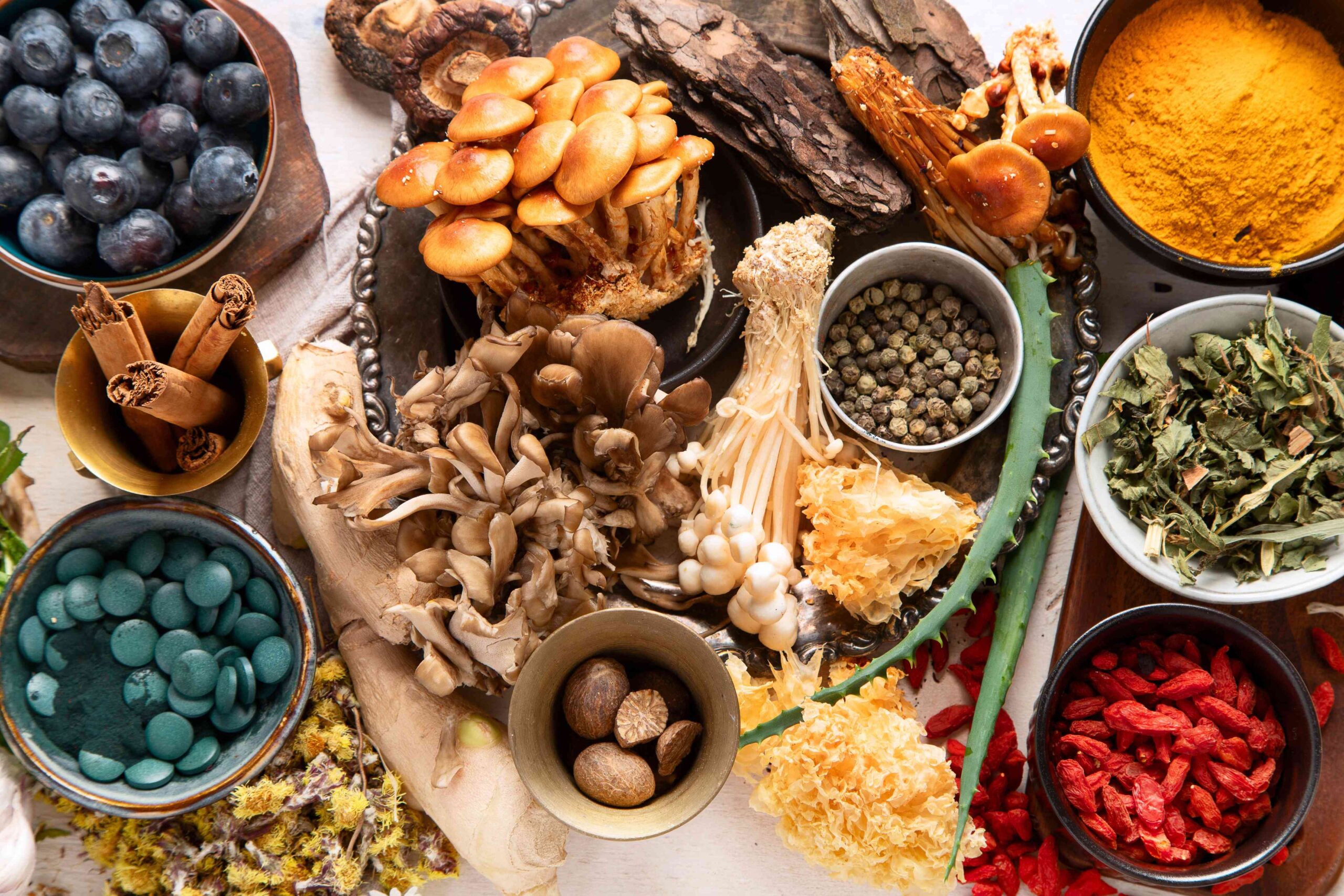
“Tinnitus – TCM” from tcmshanghai.ae and used with no modifications.
Traditional Chinese Medicine (TCM) offers a sophisticated approach to tinnitus that differs significantly from Western herbalism. Rather than treating tinnitus as a single condition, TCM practitioners classify it into different patterns based on underlying imbalances in the body’s energy systems. Each pattern requires a specific herbal formula, often containing 5-15 herbs that work synergistically to address the root cause of symptoms while supporting overall ear health.
Traditional Formulations That Target Different Tinnitus Types
According to TCM theory, tinnitus can stem from several pattern imbalances, each requiring a different herbal approach. Kidney yin deficiency tinnitus, characterized by low-pitched ringing, dizziness, and night sweats, responds well to formulas containing rehmannia and cornus. For liver yang rising tinnitus, marked by high-pitched ringing, irritability, and headaches, formulas with chrysanthemum and uncaria are often prescribed. Phlegm-fire tinnitus, associated with sudden onset, fullness in the ears, and anxiety, typically responds to formulas containing bamboo shavings and pinellia.
These traditional formulations are not simply collections of herbs but carefully balanced prescriptions where each herb serves a specific purpose. Some herbs directly target tinnitus symptoms, while others support digestion to enhance absorption, moderate the effects of stronger herbs, or address secondary symptoms. This holistic approach recognizes that tinnitus rarely occurs in isolation but typically reflects broader imbalances throughout the body, which can be further explored through chakra healing techniques.
Er Long Zuo Ci Wan and Its Components
Among the most renowned TCM formulas for tinnitus is Er Long Zuo Ci Wan (literally “Two Dragons Nourish the Left Ear Pills”). This classical formula contains key herbs like prepared rehmannia, cornus, asiatic cornelian cherry, Chinese yam, and magnetite. The combination works primarily to nourish kidney essence, which in TCM is considered fundamental to ear health and hearing function. Modern research has found that several components in this formula demonstrate neuroprotective properties that may help preserve auditory function.
A modified version of this formula has been studied in clinical trials with promising results. One study involving 142 patients with chronic tinnitus showed significant symptom improvement in 78% of participants after 30 days of treatment. The formula appears particularly effective for age-related tinnitus and cases associated with hearing loss, which aligns with its traditional use for strengthening the kidneys’ role in supporting ear health.
Working With a Qualified Herbalist for Best Results
The complexity of TCM herbal formulations makes working with a qualified practitioner essential for optimal results. A trained TCM herbalist will conduct a comprehensive assessment including pulse diagnosis, tongue examination, and detailed symptom analysis to determine your specific tinnitus pattern. This personalized approach allows for custom-tailored formulations that can be adjusted as your condition changes. Many practitioners now offer telehealth consultations, making this specialized care more accessible than ever.
Creating Your Own Herbal Tinnitus Blend
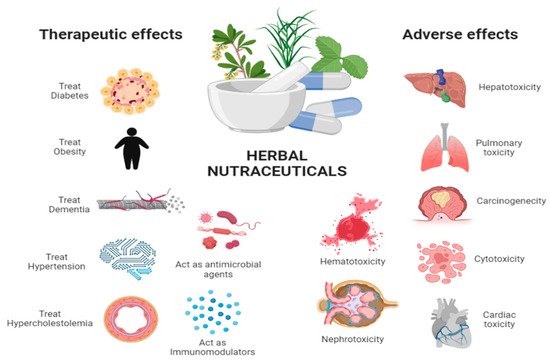
“An Overview of Herbal Nutraceuticals …” from www.mdpi.com and used with no modifications.
For those interested in a more hands-on approach, creating a personalized herbal blend can be both empowering and effective. The key lies in matching specific herbs to your particular tinnitus triggers and symptoms while respecting proper preparation methods and dosages. While pre-formulated supplements offer convenience, custom blends allow for precise adjustments based on your body’s response. Start with high-quality, organic herbs from reputable suppliers to ensure potency and purity. For more information on natural remedies, explore our list of top herbal teas for tinnitus relief.
1. Matching Herbs to Your Specific Symptoms
The first step in creating an effective personal blend is identifying your specific tinnitus pattern. If your tinnitus worsens with stress and is accompanied by tension headaches, nervous system calming herbs like passionflower, lemon balm, and skullcap may form your foundation. For tinnitus that fluctuates with blood pressure or becomes more noticeable when tired, circulation-enhancing herbs like ginkgo, hawthorn, and rosemary might be more appropriate. When inflammation seems to be a key factor, consider anti-inflammatory herbs such as turmeric, boswellia, and ginger as core components of your blend.
2. Starting With Single Herbs Before Combining
When beginning your herbal journey, resist the temptation to combine multiple herbs immediately. Start with a single herb for at least two weeks, carefully noting any changes in your tinnitus symptoms. This methodical approach helps identify which herbs specifically benefit your condition and which might cause adverse reactions. Once you’ve established beneficial single herbs, you can begin creating simple combinations of 2-3 herbs, gradually building toward more complex formulations as you understand how each herb affects your symptoms.
3. Tracking Results With a Symptom Journal
Maintaining a detailed symptom journal is crucial when using herbal remedies for tinnitus. Record daily tinnitus intensity (on a scale of 1-10), duration, tone/quality, and any factors that seem to influence your symptoms. Note the specific herbs taken, dosages, times of administration, and any other lifestyle factors that might affect your condition. This systematic tracking reveals patterns and correlations that might otherwise go unnoticed, allowing you to refine your herbal approach based on objective data rather than general impressions.
For maximum benefit, include sections in your journal for sleep quality, stress levels, and dietary factors, as these often significantly impact tinnitus symptoms. Many people discover surprising connections—such as certain herbs working better during particular seasons or in combination with specific lifestyle practices—that would be impossible to identify without consistent tracking.
4. Safe Preparation Methods for Teas and Tinctures
Proper preparation of herbal remedies ensures maximum therapeutic benefit while minimizing potential risks. For tinnitus-relieving teas, use water that’s hot but not boiling (around 180°F) to preserve delicate compounds in herbs like lemon balm and passionflower. Steep covered for 10-15 minutes, strain thoroughly, and drink 1-3 cups daily between meals for optimal absorption. Adding a small amount of honey can improve palatability without diminishing medicinal properties.
For tinctures, which offer higher potency and longer shelf life, the standard ratio is 1:5 for dried herbs (1 part herb to 5 parts menstruum) or 1:2 for fresh herbs, using a combination of 60-70% alcohol and 30-40% water. Store prepared tinctures in amber glass bottles away from direct light and heat, labeling clearly with contents and preparation date. Most tinctures remain potent for 2-3 years when properly stored, making them a convenient option for long-term tinnitus management.
5. When to Adjust Your Herbal Protocol
Herbal protocols for tinnitus should evolve as your symptoms and body change. If you’ve used a particular formula consistently for 6-8 weeks without improvement, it’s time to reassess and adjust. Similarly, if you initially experienced benefits that have plateaued, your body may have adapted to the current herbs, signaling the need for modification. Consider rotating between different herbal approaches every 2-3 months to prevent adaptation and maintain effectiveness.
Seasonal adjustments can also optimize results, as tinnitus symptoms often fluctuate with environmental changes. Many people find warming circulatory herbs like ginger and cayenne more effective during colder months, while cooling anti-inflammatory herbs like chrysanthemum and mint provide greater relief during summer. Listen to your body’s responses and don’t hesitate to modify your approach based on changing symptoms, stress levels, and seasonal influences.
Safety First: What You Must Know Before Taking Herbal Remedies
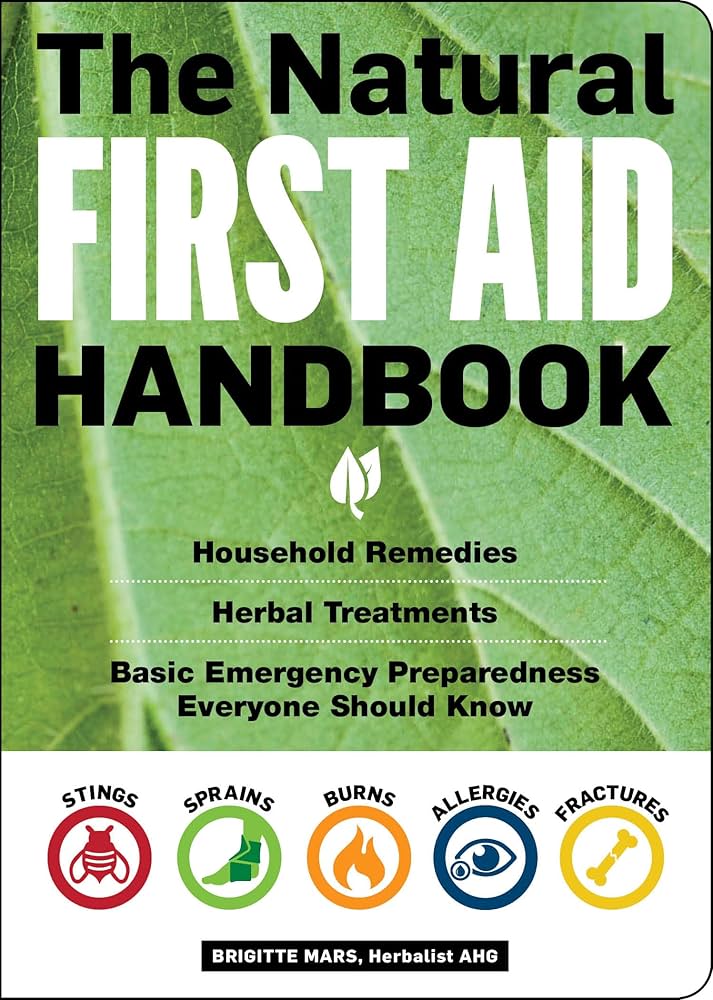
“The Natural First Aid Handbook …” from www.amazon.com and used with no modifications.
Despite their natural origins, herbal remedies are powerful biological agents that require the same caution and respect as pharmaceutical medications. Many contain active compounds that can interact with medications, affect blood clotting, impact blood pressure, or influence liver function. The myth that natural always means safe has led many tinnitus sufferers to experience preventable side effects or dangerous drug interactions. Understanding safety parameters before beginning any herbal regimen is absolutely essential.
Quality and purity concerns present another significant safety consideration. The herbal supplement industry remains less regulated than pharmaceuticals, resulting in wide variations in product quality. Always purchase herbs from reputable companies that provide third-party testing for potency and contaminants. For tinnitus management specifically, consistency in dosing is crucial for evaluating effectiveness, making standardized extracts preferable to raw herbs in many cases.
Red Flags That Signal Medical Attention Is Needed
While exploring herbal remedies for tinnitus, certain symptoms should prompt immediate medical attention. Sudden hearing loss accompanying tinnitus, especially in one ear, requires emergency evaluation as it may indicate a serious underlying condition. Similarly, tinnitus that begins after a head injury, is accompanied by severe dizziness, or occurs with neurological symptoms like facial numbness warrants prompt medical assessment. These scenarios represent potentially serious conditions where delaying conventional treatment to try herbal remedies could lead to permanent damage.
Watch for signs of allergic reactions to herbal preparations, which can range from mild skin irritation to life-threatening anaphylaxis. Symptoms like rash, itching, swelling (especially of face, tongue, or throat), severe dizziness, or trouble breathing after taking an herbal remedy require immediate medical attention. Keep in mind that allergic reactions can develop even to herbs you’ve previously tolerated, particularly with concentrated extracts that contain higher levels of potential allergens.
Herbs to Avoid With Certain Medical Conditions
Several herbs commonly recommended for tinnitus can be problematic for people with specific health conditions. Ginkgo biloba, while beneficial for many, can increase bleeding risk and should be avoided by those on blood thinners or with bleeding disorders. Black cohosh may adversely affect those with liver conditions, while hawthorn can interact with heart medications and blood pressure drugs. St. John’s Wort, sometimes suggested for tinnitus-related stress, interacts with numerous medications including antidepressants, birth control pills, and immunosuppressants, potentially reducing their effectiveness.
Consulting Healthcare Providers Before Starting Treatment
Before beginning any herbal regimen for tinnitus, consult with healthcare providers familiar with both your medical history and herbal medicine. This integrated approach helps identify potential interactions with current medications and ensures your treatment plan addresses the underlying causes of your tinnitus rather than just masking symptoms. Many conventional doctors now work collaboratively with naturopaths, herbalists, or integrative medicine specialists to create comprehensive treatment plans that safely combine the best of both approaches.
- Bring a complete list of all medications and supplements you currently take
- Share any previous reactions to herbs or medications
- Discuss your complete medical history, including liver and kidney function
- Ask about potential interactions specific to your health conditions
- Request guidance on appropriate dosing and monitoring parameters
When selecting healthcare providers for consultation, look for practitioners with specific training in herbal medicine and experience with tinnitus treatment. Naturopathic doctors, clinical herbalists with professional certifications, and integrative medicine physicians often have the specialized knowledge needed to guide safe herbal use. Many professional organizations maintain directories of qualified practitioners, making it easier to find someone with appropriate credentials in your area.
FAQ: Herbal Remedies for Tinnitus
The following questions address the most common concerns about using herbal remedies for tinnitus management. These answers are based on current research and clinical experience, though individual responses to herbal treatments vary considerably based on tinnitus type, duration, and underlying causes.
How long does it take for herbal remedies to reduce tinnitus symptoms?
Most herbal remedies require consistent use for 4-12 weeks before significant benefits appear. Unlike pharmaceutical drugs that often work quickly, herbs typically produce gradual improvements as they address underlying imbalances. Ginkgo biloba, for instance, usually requires 8-12 weeks of regular use before maximum benefits are achieved. Some people notice subtle improvements within the first few weeks, while others may need several months of consistent use. Maintaining a detailed symptom journal helps track these gradual changes that might otherwise go unnoticed.
Can herbal remedies cure tinnitus completely?
While herbal remedies can significantly reduce tinnitus symptoms for many people, complete elimination of tinnitus is rare, especially for chronic cases. Herbs work best as part of a comprehensive approach that includes addressing underlying causes (such as hearing damage or circulation problems), managing stress, improving sleep quality, and protecting ears from further damage. The most realistic expectation is a reduction in tinnitus volume and distress rather than complete disappearance of symptoms, though some people with mild or recent-onset tinnitus do experience complete resolution.
Are there any herbal remedies I should avoid if I have tinnitus?
Certain herbs may actually worsen tinnitus symptoms for some individuals. Quinine-containing herbs like cinchona bark can trigger or intensify tinnitus, as can high doses of stimulant herbs such as ephedra, guarana, and excessive caffeine from tea or coffee. Some people report temporary tinnitus exacerbation with salicylate-containing herbs like meadowsweet and willow bark. These reactions vary considerably between individuals, highlighting the importance of introducing herbs one at a time and carefully monitoring your response.
Additionally, herbs that increase blood pressure or stimulate the nervous system may temporarily worsen tinnitus in people whose symptoms are aggravated by stress or circulatory issues. These include ma huang (ephedra), guarana, yohimbe, and high doses of licorice. Always research potential side effects before trying a new herb, and discontinue use if you notice your tinnitus worsening after administration. For more information on which herbs to avoid, check out this guide on top herbs for tinnitus.
Should I stop taking my prescribed medications when starting herbal treatments?
Never discontinue prescribed medications without consulting the healthcare provider who prescribed them. Herbal remedies should typically complement rather than replace conventional treatments, especially for serious underlying conditions that may contribute to tinnitus. If you’re concerned about interactions between herbs and your medications, work with knowledgeable healthcare providers to develop an integrated approach. In many cases, timing the administration of herbs and medications several hours apart can minimize potential interactions while allowing you to benefit from both approaches. For more insights, you can explore herbal teas for tinnitus relief.
What’s the difference between Western and Eastern herbal approaches to tinnitus?
Western herbalism typically focuses on specific herbs for symptom relief, often using single herbs or simple combinations targeted directly at tinnitus symptoms. This approach emphasizes understanding the pharmacological actions of herbs, such as improved circulation from ginkgo or nervous system support from passionflower. Eastern traditions like Traditional Chinese Medicine and Ayurveda use complex formulations addressing the person’s overall constitutional pattern rather than just the tinnitus symptoms, often requiring professional assessment to determine the appropriate formula for your specific imbalance pattern.
Both approaches have merit, and many practitioners now integrate Eastern and Western herbal traditions for tinnitus management. While Western herbalism may be more accessible for self-treatment, the personalized, system-based approach of Eastern traditions often provides more comprehensive results, especially for complex or long-standing cases. For optimal outcomes, consider working with practitioners familiar with multiple herbal traditions who can customize approaches based on your specific needs.
Finding relief from tinnitus often requires patience and a willingness to explore multiple approaches. By combining well-researched herbal remedies with appropriate lifestyle modifications and professional guidance, many people experience significant improvements in both tinnitus symptoms and overall quality of life. Remember that herbal medicine works best as part of an integrated approach that addresses the underlying factors contributing to your specific tinnitus pattern.
Herbal remedies have been used for centuries to treat various ailments, including tinnitus. Many people turn to natural solutions in search of relief from the persistent ringing in their ears. While some herbal blends may offer temporary relief, it’s essential to understand which ingredients are most effective. For example, ginkgo biloba is often cited for its potential benefits in improving blood circulation, which may alleviate tinnitus symptoms. However, it’s crucial to approach these remedies with caution and consult with a healthcare professional. For those interested in exploring modern alternatives, the use of neuromodulation devices has shown promise in providing relief for tinnitus sufferers.









